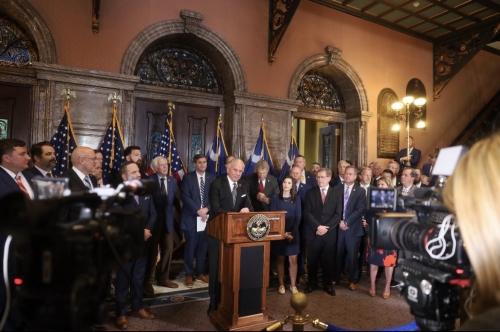This article by Patrick Gleason was originally published in Forbes and quotes Palmetto Promise Senior Fellow Dr. Oran Smith.
COLUMBIA, S.C. — 2025 is a big year for tax reform and the work now being done on Capitol Hill to extend the tax relief enacted in 2017 as part of the Tax Cuts And Jobs Act is not the only reason that’s the case. With one week until the end of the first quarter, legislation to cut income taxes has been enacted in nine states and Michigan is poised to become number 10 with a bill reducing the state’s flat income tax from 4.05% from 4.25%. That tax cut, which would retroactively take effect January 1, 2025, passed out of the Michigan House of Representatives on March 18 by a vote of 65-43 and will soon be taken up by the state senate.
Of all the income tax cuts that have been introduced in state capitals so far this year, one that might make the most significant improvement to a state tax climate is the one introduced today by South Carolina House Speaker Murrell Smith (R-Sumter) and his statehouse colleagues. Under the tax plan announced at a press conference at the state capitol, South Carolina would go from having the highest personal income tax rate in the region to the lowest outside of the no-income-tax states.
The tax plan unveiled by Speaker Smith, filed as House Bill 4216, would move South Carolina from a progressive income tax code with a top rate of 6.2% to a 3.99% flat rate next year. H. 4216 also schedules further rate reductions for the next few years contingent upon revenue triggers. So long as revenue collections meet specified targets, South Carolina’s income tax rate could fall further, dropping as low as 2.49%.
With Speaker Smith’s proposal, South Carolina would leapfrog neighboring Georgia and North Carolina in the tax rankings to boast a lower rate than the two neighboring states, which many see as South Carolina’s top competitors for job-creating investment. In fact, if H. 4216 is enacted and revenue triggers are met, South Carolina would go from having the highest income tax rate in the Southeast, to the lowest rate in the nation, besting Arizona’s 2.5% flat tax.
Enactment of H. 4216 would have South Carolina matching or exceeding the rate reduction enacted in many other Republican-run states in recent months and years. Unlike many of those income tax rate-reducing plans, however, Speaker Smith, House Ways & Means Committee Chairman Bruce Bannister (R-Greenville), and their colleagues are facilitating income tax rate reduction without applying the sales tax to previously untaxed services. Instead, H. 4216 brings the income tax rate down using nearly a third of the ongoing budget surplus, along with new revenue derived from changing the way in which South Carolina’s tax code conforms to the federal tax code.
South Carolina is currently one of only five states that use federal taxable income as the basis for state taxation. H. 4216 broadens the tax base by switching to federal adjustable gross income (AGI), which is the basis used by 32 other states, including Georgia and North Carolina. Under H. 4216, all additional revenue collected on that broader tax base is plowed into rate reduction for all taxpayers.
“State income taxes are best applied to a broad base with a low, flat rate (at least until it’s zeroed out),” said Ryan Ellis, an IRS enrolled agent who runs a tax preparation business and is president of the Center for a Free Economy. “AGI’s broader definition of income is used by most states for a reason—it’s a more accurate definition of income, and it gets the states out of the deductions business.”
“The Speaker’s plan is a dream come true for us,” said Palmetto Promise Institute Senior Fellow Dr. Oran Smith. “His bill is consistent with recommendations our scholars have been making since 2014. Low. Flat. AGI. It has all the elements of sound, pro-growth tax policy.”
Joining Speaker Smith at this morning’s press conference announcing the new tax plan were Senate President Thomas Alexander (R), Senate Finance Committee Chairman Harvey Peeler (R), and Governor Henry McMaster (R). During his press conference remarks, Governor McMaster called on legislators to get a bill cutting the state income tax to his desk before adjourning the current session, which is scheduled to end May 8.
“I’m so proud of us to continue working together both House and Senate, Finance and Ways and Means to make this happen, and not just end this today on income tax, but also address sales tax and property tax, we need to lower both too,” Senator Peeler said at the press conference, during which he indicated that the Senate may have additional tax-cutting ideas to contribute to the final product. “There’s nothing this team can’t do working together,” Peeler added.
The tax plan announced at the South Carolina statehouse today — aside from making the Palmetto State an even more attractive place to live, do business, and invest — is the latest example demonstrating how South Carolina, though it has long been considered a deep red state, has only recently begun to implement major conservative reforms. Not only is South Carolina now catching up to other red states, it is even surpassing them in some areas.
The plan is for the House to pass H. 4216 in the coming weeks, at which time it will be up for Senate consideration and likely modification. If H. 4216, or something like it, is enacted this year, South Carolina will go into the second half of the 2020s with a far more competitive tax climate.




